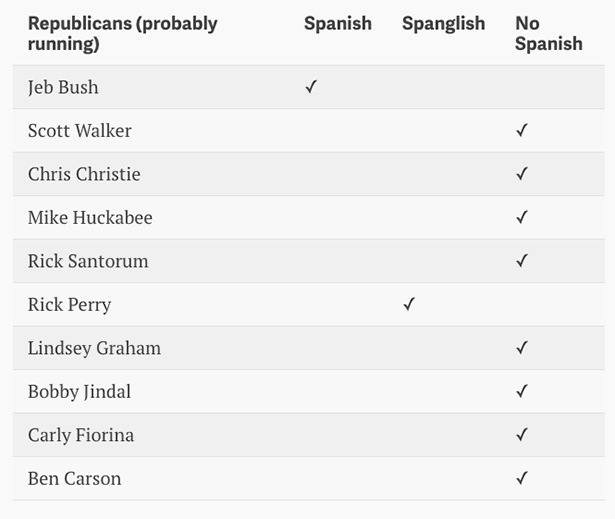
Marco Rubio is fluent in Spanish and has done televised interviews in the language. Christopher Halloran / Shutterstock.com
When Hillary Clinton announced, via video , that she would run for president in 2016, US commentators wasted no time dissecting every detail of every clip. One moment stood out—“Mi hermano y yo estamos empezando un primer negocio,” says one man in the video. “My brother and I are starting our first business.”
It’s an obvious appeal to Hispanic voters, a demographic which is expected to double by 2030 . But what makes the inclusion interesting is Clinton’s record on Spanish-language campaigning. Or lack thereof, until now. Clinton doesn’t speak Spanish, and she’s never pretended to. But in the run-up to her 2008 attempt at the White House, she noticeably abstained from making any overtures to Latino voters in their language; save for a mildly embarrassing grammatical snafu at a rally for Cesar Chavez’s United Farm Workers union. She declined to participate in a Spanish-language televised debate for Univision that year as well.
In this light, the “Getting Started” video marks an intriguing shift in how Clinton courts Latinos. In a review of the candidate’s freshly bilingual website, Fox News Latino’s Elizabeth Llorente writes, “Although two of the four politicians who have launched their campaigns so far are Hispanic, the only one seriously reaching out to Spanish-speaking voters on their campaign website is not: former secretary of state Hillary Clinton.”

The two Latino candidates she refers to are senator Ted Cruz of Texas and senator Marco Rubio of Florida, both Republicans of Cuban descent. Rubio, unlike Clinton, is fluent in Spanish:
Cruz, however, has been reluctant to demonstrate his acumen. In the 2012 runoff election for his Texas senatorial seat, opponent David Dewhurst challenged Cruz to a televised Spanish-language debate. In an interview with Fox News, Cruz laughed off the idea , saying it was part of “the silly season of politics.”
“I don’t think we should do a debate in Spanish,” Cruz added. “Most Texans speak English. If we were in Mexico or in Cuba, we’d do the debate in Spanish. Here in Texas, we should do it in English.”
Cruz has since admitted that his Spanish is “lousy,” and the he grew up speaking “Spanglish.”

The third confirmed Republican candidate for 2016, Rand Paul, also claims a proficiency in “Spanglish”—but the Kentucky senator can back it up. He delivered a speech on immigration reform in May 2013 to the US Hispanic Chamber of Commerce that was liberally sprinkled with Spanish words and phrases. It appeared to be a genuine effort.
Of the Democratic politicians rumored to be mulling a run for the White House in 2016, only Maryland governor Martin O’Malley has demonstrated any familiarity with the language. He studied Spanish in high school, and engages regularly with Spanish-language media. And any capability he lacks in actual linguistic acuity, he apparently makes up for in enthusiasm.
“He reminds me of President George W. Bush,” Gustavo Torres, the executive director of CASA Maryland, told BuzzFeed’s Adrian Carrasquillo . “He was so engaged with the Latino community in Texas, that for him it was very natural to speak about Latinos. That’s exactly what’s happening here. He has been so engaged with us, it’s very natural to be engaged with immigrants.”

(*Speaks Vietnamese!)
Bush shares a link to the Latino community with his younger brother, Florida governor Jeb Bush, who is “actively exploring a 2016 run.” Aside from Rubio, Bush appears to be the only other mainstream presidential candidate with a fluent command of the language:
At 17, Bush taught English as a second language in Léon, Mexico. There, he met his wife, Columba. He later graduated from the University of Texas at Austin with a bachelor’s degree in Latin American Studies.
Bush recently put his Spanish-language skills to use during a visit to the US territory of Puerto Rico. There, he delivered a speech—en español, claro—advocating for Puerto Rican statehood; an interesting stance for a Republican governor to hold, given that Puerto Rico has long been a Democratic stronghold. And Republican leaders from the mainland haven’t had too much success navigating the island’s cultural and linguistic crossovers.

Rick Santorum, another potential 2016 hopeful, ruffled feathers in a 2012 interview with El Vocero, a San Juan newspaper. In it, he insists that, in the event of Puerto Rican statehood, English would have to become the island’s “main language.”
“As in any other state, you have to comply with this and any federal law. And that is that English has to be the main language,” he said; forgetting to note, hopefully unawares, that the US has no official language at the federal level. Santorum, as it so happens, does not speak Spanish.
A quién le importa? Who cares?
Does a US presidential candidate need to speak Spanish? Looking at the numbers, it certainly cant’t hurt. Spanish is by far the most spoken non-English language in the country. It is also the fastest growing. The number of US Spanish speakers is up 233% since 1980, according to Pew . (And—good news for Jim Webb—the number of Vietnamese speakers is up 599%.)
That said, among Latinos, the trend is reversing. Though as an ethnic demographic, Latinos seem to be in a perpetual state of growth, the number of Latinos who speak Spanish at home is shrinking. Meanwhile, the number of Latino families who speak English exclusively at home is growing. By 2020, only 66% of Latinos will speak Spanish as a first language. Thirty-four percent will only speak English—mirroring the decline of Italian, German, and Polish at the start of the 20th century.
But numbers alone aren’t enough to explain how Spanish-speaking candidates translate on the ground. There are notable political advantages: “There is a sense that when a Hispanic candidate can speak in Spanish, you’re talking in-group,” Democratic consultant James Aldrete told Texas Monthly . “Spanish shows shared experiences, and politically, as cliché as it sounds, it says, ‘I’m one of you.’”
But an over-reliance on Spanish-language skills can just as easily kill a campaign. Without a clear stance on issues important to Latino communities—immigration, wage reform, public health—candidates can appear only superficially engaged; concerned with only the trappings of what it means to be Latino in America. “You can’t just eat a taco and give a speech in Spanish,” Sam Popkin, a political-science professor at the University of California at San Diego told The Daily Beast . “It’s about your policies.”
(Image via Christopher Halloran / Shutterstock.com )
NEXT STORY: Ben Carson Is Running for President






